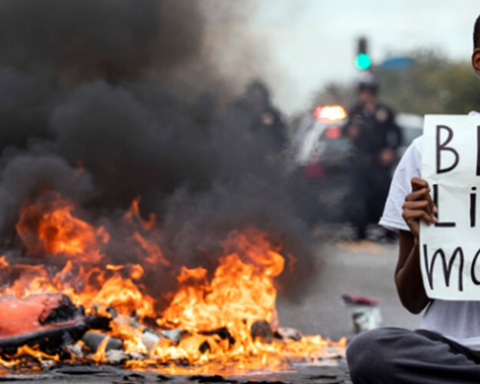Published on 28/06/2020 in El Aromo n° 111/News
Since Saturday, June 6, J.K. Rowling, the author of Harry Potter, has been in the eye of a storm for a series of tweets where she claimed that women are the only ones who menstruate. A day before the public presentation of Against the Erasure of Women (an international alliance of women fighting against the erasure of women in history), a large part of the cast of the films and the fandom of the magical world Rowling created came out to criticize her remarks. In this article we tell you why feminists are on the warpath.
Dolores Martínez González
(Trece Rosas – Argentina)
Queer fundamentals
Queer theory postulates, based on an anthropologic particularism, that sex is a social construct. Hence, desire is governed by the subjective principle, taking for granted that what one «feels» is nothing but what one is. Thus arises the ideology of the «wrong body», as if a fact could be «wrong». However, in queer imagery there is nothing left but to accept that there is a pre-social and pre-biological «essence», which in human history has a name: soul.
It is presented as a feminist theory that fights against patriarchy and its violence. However, denying sex as a natural and objective fact and promoting gender as an individual desire, does not stop society from identifying and hierarchizing men and women. In such a way that such nonsense only serves to pass off diversity as equality.
Feminism fights for the collective emancipation of women and when this agenda has not yet been fulfilled, a patriarchal strategy tries to throw overboard all the achievements of the past. The latest step in this patriarchal advance is the legal elimination of the sex category in documentation.
Here and all over the world, more of the same
A brief historical and geographical tour through international legislation shows how this advance has been taking place since the beginning of the century:
2004 -> Great Britain: In 2004 passed the Gender Recognition Act, which allows transgender people to apply to receive a Gender Recognition Certificate (GRC).
2007 -> Spain: Law 3/2007 establishes that transsexual persons may modify the name and sex reference in their identity documents without the need to undergo genital surgery and without judicial proceedings, following today’s publication in the Official State Gazette of the Law regulating the registry rectification regarding the sex of persons.
2009 -> Pakistan, India and Bangladesh: Established the addition of the third gender option in censuses and official documents
Uruguay: Law No. 18.620, legitimizes the right to gender identity. Under its regulations, a change of name and marker can be obtained in the Family Court, providing evidence that explains why the person is not recognized with the sex stipulated in his or her identity card. The procedure can take more than two years.
2011-> Nepal: Established adding the third gender option in censuses and official documents.
2012 -> New Zealand: Allowed transgender citizens to mark with an X the boxes indicating gender on official documents, thus giving the option of «indeterminate or unspecified sex», without further formalities.
Argentina: Argentina’s Gender Identity Law (26.743) states that «all persons have the right to recognition of their gender identity», so that transgender people can easily change their gender on their passports and are guaranteed «transition» medical treatment, if they so wish.
2014 -> Germany: Recognizes the «third gender» on official documents, such as birth certificates, for intersex children (i.e., those born with both male and female sex traits); in adult life, the subject may choose his or her own sex. Similarly, transgender citizens may freely update their gender.
Australia: The authorities recognized a «third sex» in their laws. While this option had been available on passports since 2011, it was then marked simply as «indeterminate sex.»
Denmark: Allowed its transgender citizens to declare their gender with an X, instead of the traditional M and F for «male and female»; to enjoy this right, however, one must reach the age of majority and go through a six-month waiting period.
2015 -> Ireland: Officially recognized that transsexual and transgender people could change their sex on official documents such as passports, as long as they are of legal age, and without the need for certification or medical treatment.
Colombia: You can freely change your name and sex on official documents, such as passports, without the need for medical certification.
Malta: A law was published allowing its transgender citizens to update their sex on official documents such as passport or birth certificate, or to declare a «third gender» – or refusal to declare a gender – with an X on their documentation.
2016 -> France: The Parliament passed a law allowing trans people who have not undergone surgery and have not started the medicalization process to change their legal name and gender on their identity documents.
Bolivia: Law No. 807 does not establish medical requirements for the change of name or gender marker. In other words, no surgery or sterilization is required. The regulation only requires a technical psychological examination that guarantees that the person knows and assumes the implications of his or her decision, and it takes a maximum of 15 days to be processed. A year later, the veto prohibiting them from marrying or adopting was declared unconstitutional.
Ecuador: The Organic Law for the Management of Identity and Civil Data establishes that any person over 18 years of age may request the civil registry to change their name or gender marker, without additional requirements. This procedure can be carried out only once, and when it is done, it changes from saying «sex» on the ID card to «gender» itself
Peru: The Constitutional Court recognized the right of transsexuals to change their sex and name on their national identity card. Although the body agreed that it can be done through a summary procedure without establishing requirements, in its ruling it explicitly stated that «it should not always be determined based on genitalia». The ruling also removed the character of transsexuality as a pathology.
2017 -> Venezuela: while the Organic Law of the Civil Registry stipulated that any citizen of legal age may change his or her name, the Supreme Court recognized the right of individuals to change their gender after various examinations. However, the Constitutional Chamber established that each case will be analyzed individually.
2018 -> Chile: Law 21120 that recognizes and gives protection to the right and gender identity. The purpose of this law is to allow the change of a person’s name and registered sex, when the registered name does not correspond or is not congruent with the person’s gender identity.
While this legal advance is taking place, in our country we still do not have a law on voluntary interruption of pregnancy and the political documents of feminist struggles are written in «inclusive language.» [1] As we mentioned in the previous section, in 2018 the deputies of the Movimiento Evita block (Silvia Horne, Lucila De Ponti, Leonardo Grosso and Araceli Ferreyra) who today are part of the Frente de Todos presented in the Chamber of Deputies the project of «Law against compulsive sexual assignment: elimination of the sex category in documents and protection of bodily diversity» which has the following file: 7037-D-2018.
«I must not tell lies»
On Saturday, June 6, J.K. Rowling was trending on Twitter and not for Harry Potter news. In line with what she proposes in the fifth part of the saga, when Harry and Dumbledore put their public figures on the line to confront the power and the return of Voldemort, J.K. had posted the following message: «‘Peoplewhomenstruate’ I’m sure there used to be a word for those people. Someone help me out. Wumben? Wimpund? Woomud?»[2], referring to an article that referred to women with that paraphrase.
At the end of 2019, Rowling had given hints of her stance on this issue, when she defended Maya Forstater, an English tax specialist who had lost her job for her tweets described as «transphobic». Already at that time, J.K. was accused of TERF [3] and her books were publicly burned (scenes reminiscent of Nazism). This time, however, the aggressions escalated much further. Her following statements had fierce responses: «If sex is not real, there is no same-sex attraction. If sex is not real, the lived reality of women worldwide is erased. I know and love trans people, but erasing the concept of sex eliminates the ability of many people to discuss their lives in a meaningful way. It’s not hate to tell the truth.»[4]. Rowling sums it up bluntly, «‘Feminazi,’ ‘TERF,’ ‘bitch,’ ‘witch.’ Times change. Woman-hating is eternal.»[5] The aggressions increased, Daniel Radcliffe and Emma Watson joined the controversy by arguing that transwomen are women, all to the delirious point of those who began to roll on social networks that J.K. was not the author of the Harry Potter saga (or that if she was, she didn’t deserve to be).
When a woman puts her career, fame and business at stake to tell the truth, to point out that sex is a material reality and that based on it there is a social structure that subordinates women based on the ideology of femininity and domination, the patriarchy sets in motion its misogynist structure, now in the form of queerism. Even Warner is threatening to stop producing her films and the newspaper The Sun publishes on its cover an interview with her violent ex-husband who claims to have beaten her and not to feel any regrets.
Against the erasure of women
Alicia Miyares began the presentation of the first seminar held by the Alliance Against the Erasure of Women by saying: «Feminists have the obligation to explain to society the consequences of identity politics and the elimination of sex as a legal category: it erases women’’ If we deny that sex exists, if we eliminate it, all the progress that feminism has made to date in coping with the difference between men and women will have disappeared. If anyone can be a woman: a femicide would only be a murder and the violence exercised on women would simply be violence, since in the absence of sex there is no aggravating factor in patriarchal violence. We lose the sports and spaces segregated by sex and the language that marks us as women. We have a specific agenda for our material reality that has the ultimate goal of ending patriarchy.
Queer theory does not allow us to elaborate a feminist politics, but on the contrary, at every step it reinforces patriarchy and constantly violates us. If trans comrades choose the queer agenda, feminists must oppose that agenda. We women are more than half of humanity, we are 50% of history and we will not allow anyone to erase us. Well, yes, times have changed but we are still the witches, we are in front of the clear proof that feminism still has a road of struggles to go.






